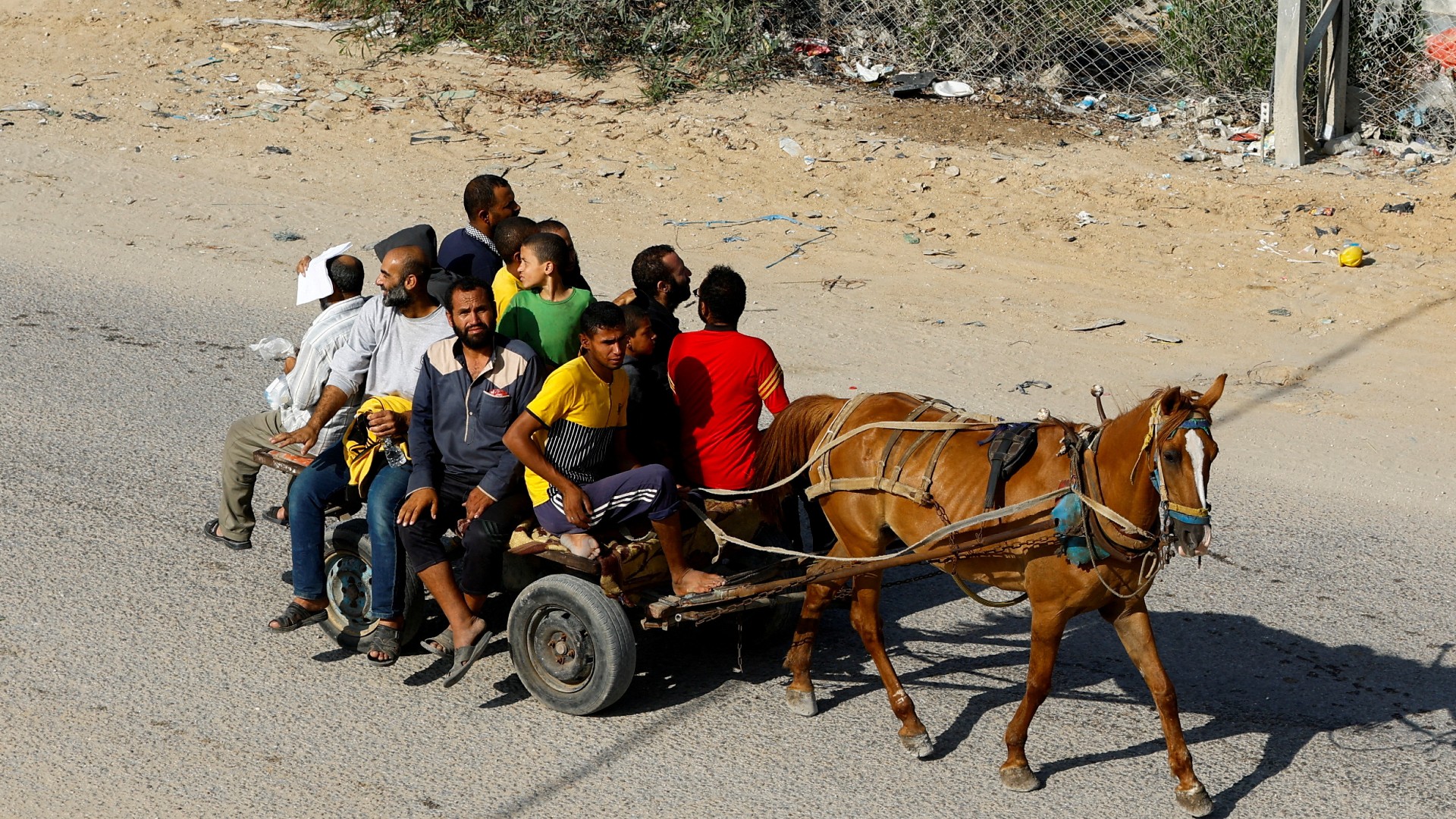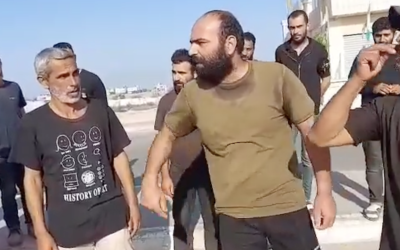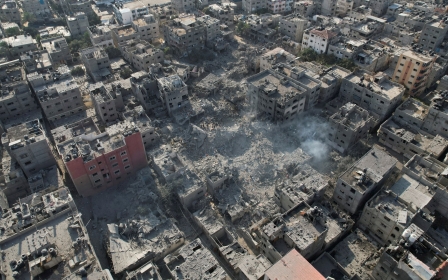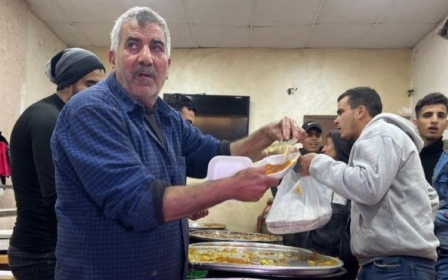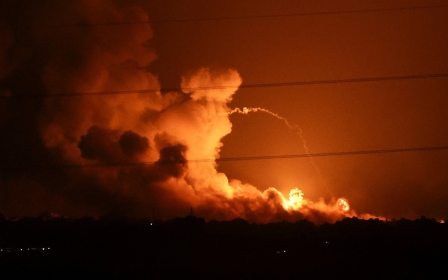Israel-Palestine war: Israeli officers torture, humiliate Palestinian workers
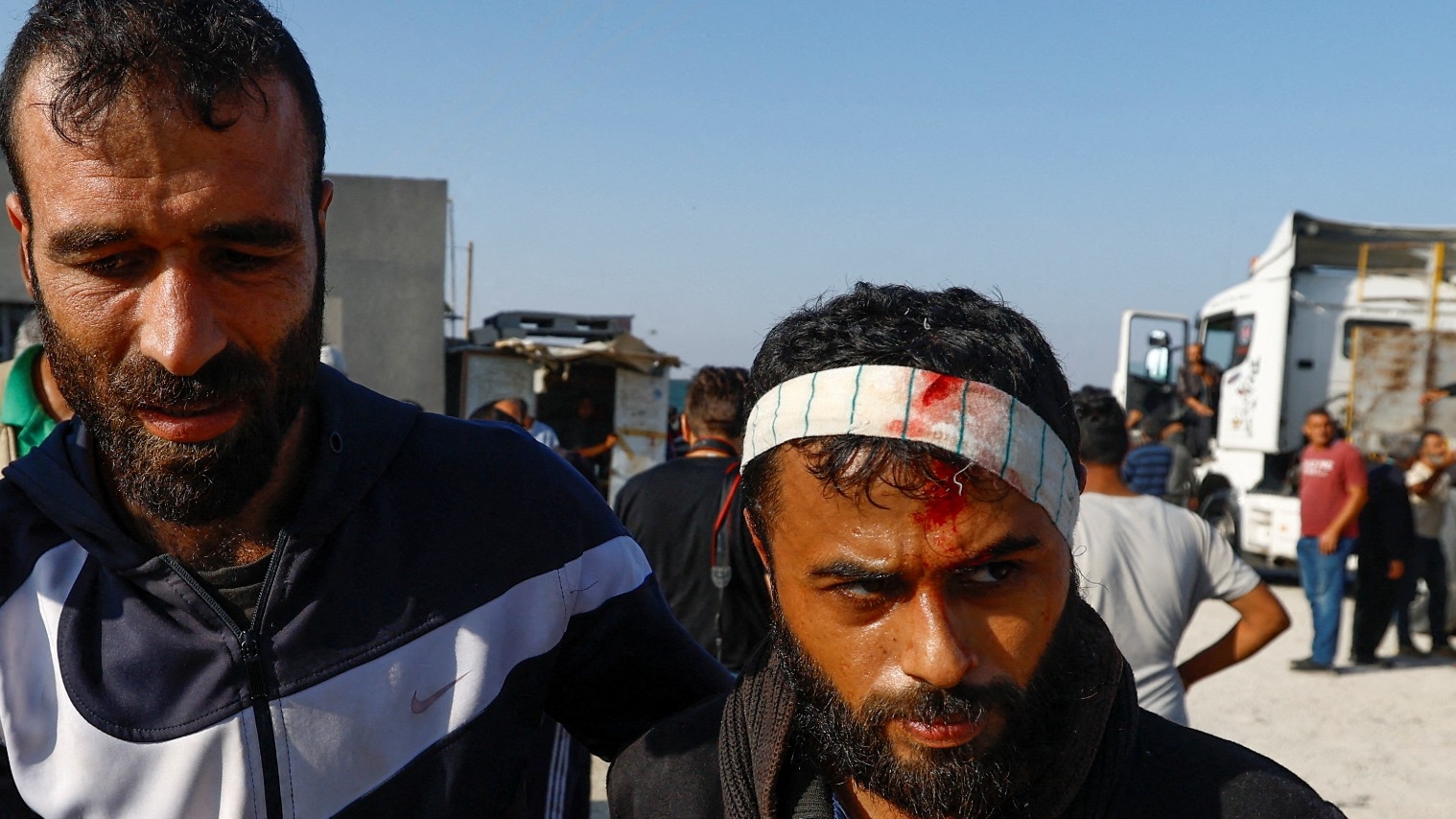
Leaning on his son’s shoulder, with a plastic shackle still wrapped around his left ankle, Khaled Ahmed* entered his family's home of refuge in the central Gaza Strip after he was released from Ofer Prison in Israel.
He was working in Jaffa when Israel declared its war on Gaza on 7 October, before he was detained with over 7,000 Palestinian workers a few days later.
On Friday, he was released, along with around 4,000 workers, and joined his wife and four children in a small house where they were seeking refuge from the Israeli bombardment of their neighbourhood.
During the detention period, Ahmed told Middle East Eye, Israeli officers were "taking revenge on Gaza" by torturing Gazan workers in Israel.
"I have been working in Israel for years. I had a valid work permit when all of this happened, Ahmed, 63, told MEE.
New MEE newsletter: Jerusalem Dispatch
Sign up to get the latest insights and analysis on Israel-Palestine, alongside Turkey Unpacked and other MEE newsletters
When Hamas and other Palestinian armed groups launched the attack on Israel, many workers left Israel and went to the West Bank, but Ahmed felt there was no need to leave.
He explained that he decided to stay in Israel after the 7 October attack, because in previous Israeli attacks on Gaza, he was still relatively safe in Israel, unlike this time.
"In the period between 7-10 October, workers were still able to move between Israel and the West Bank. On the 10th, we were trapped, unable to return to Gaza or go to the West Bank."
'The officer boiled water in the electric kettle he had in the office, poured it into a paper cup, then poured it on his face'
- Khaled Ahmed
To see the status of their work permit validity, Palestinian workers in Israel sign up to an Israeli smartphone application called al-Monasseq (Arabic for the coordinator).
If the work permit is revoked, they get notified with a text message.
But a few days after Israel launched its attack on Gaza, the Israeli authorities revoked all work permits without informing the workers, before conducting a large-scale detention campaign against them.
"They broke into our dorms, handcuffed and blindfolded us, then detained us without allowing any of us to take anything," Ahmed said. "It was around 12pm when we arrived in the place where we were interrogated. I was left alone in a cell for eight hours, before I was taken to a room where an Israeli officer interrogated me for hours."
"He asked me where I lived in Gaza, I answered him, then he showed me my house on a big screen to show me he already knew where exactly I lived. He then asked me about Hamas and other Palestinian factions, I told him I did not know anything.
"He tried to pressure me but I honestly have nothing to do with them so I could not answer."
During two hours of interrogation, Ahmed said he saw many fellow workers being beaten, tortured and humiliated.
"An officer told my colleague ‘you seem to be a good man, I would like to offer you something to drink. Do you prefer tea or coffee?’ He said he wanted tea. The officer boiled water in the electric kettle he had in the office, poured it into a paper cup, then poured it on his face," he said. "His face was burned and he screamed in pain, before he was taken outside."
Follow our live blog for all the latest on the Israel-Palestine war
"Another colleague told the officer during the interrogation that we were not informed when the permits were revoked, and asked him why they did not send text messages as they were supposed to do. He listened until [the worker] finished speaking, then hit him badly on his face and said ‘do you want to teach us what to do?’"
Ahmed said another worker was thrown to the ground and kicked several times in the abdomen by many officers. When he was brought back to the cell, he kept screaming in pain for days.
"They were beating and humiliating us as if they were taking revenge on Gaza," Ahmed said, accusing the officers of abusing them to retaliate for the 7 October incursion by armed Palestinian groups. He said that he and other workers, however, "had nothing to do" with the attacks.
"The Israelis know very well that we have nothing to do with what is going on. We are workers who were repeatedly interrogated and we underwent several security checks before we were given the work permit."
Middle East Eye has previously contacted the Israeli military for comment about allegations of the torture of Palestinian workers from Gaza but has not received a response by the time of publication.
Denial of medical care
Ahmed was held in Ofer Prison for 10 days. During this period, he and his colleagues were kept in tents set up especially for Gaza workers.
With no roof or beds, Ahmed said he and his colleagues "were freezing" at night.
"When we were brought to the cells, they took everything from us, including our phones, money, and jackets," he told MEE.
"They gave each one of us a very thin mattress along with a small blanket and a jacket. I had to keep my arms on my body when I slept because the mattress was very small it did not contain all my body, and the cell was overcrowded," he added.
"We were literally shaking at night. One night, it started raining and the situation got worse. They brought us another blanket each because otherwise we would have frozen to death."
Suffering from diabetes and high blood pressure, the father of four was not allowed to take his pills or insulin for days.
"I told them I needed to take my pills, especially that I did not eat well the whole detention period. They handcuffed and blindfolded me and took me to the prison clinic. I had to be strip-searched several times on the way there. They gave me the insulin only once, and I was not allowed to take it again after that," he continued.
"Almost all of us got fever due to the severe cold, and some were screaming in pain after they were tortured. Anyone who asked for medicine was either ignored or only given painkillers."
During the whole detention period, the workers did not know if the war on Gaza was still ongoing or had stopped.
"We did not even know the time after they took away our watches. Whenever we asked an officer or a soldier what was going on in Gaza, they would either scold us or ignore the question," Ahmed said.
Running home
On Friday morning, Israeli officers woke the workers up at dawn and asked them to take off the jackets they were given. They then blindfolded and handcuffed them, and asked them to stand in queues.
Ahmed asked a female officer in Hebrew where they were taking them. She said they were going to a "very hot place", an answer that Ahmed later realised referred to the war on Gaza.
'We ran around two kilometres nonstop until we reached the Kerem Shalom border'
- Khaled Ahmed
"We were taken to buses and the officers tied the ankle of each worker to the ankle of his colleague sitting next to him with plastic shackles. We were blindfolded and curtains covered the windows of the bus, so we could not see anything," he added.
"But I felt the sun on my face coming from the southern direction, so I expected that we were going towards the Kerem Shalom border."
Around 90 minutes later, the bus stopped and the officers cut the plastic shackles on the workers’ hands and ankles, then told them to take off the bandages on their eyes.
"We got out of the bus and stood in a queue. The soldiers told us ‘we will now let you go. You have to run as fast as you can. Do not look right or left. Anyone who tries to look behind him or stops for seconds will be shot,'" Ahmed said.
"We ran around two kilometres nonstop until we reached the Kerem Shalom border. We entered the gate and finally found Palestinian employees who welcomed us."
Without his official papers, money, or mobile, Ahmed returned to his family in the house of refuge after learning that his home was severely damaged in the ongoing bombardment.
"They took all our money. Some officers stole it for themselves. We had saved our salaries after working for months without returning to Gaza.
"A colleague of mine had around 100,000 shekels ($25,300). He had worked for several months every day and saved the money for his family back in Gaza. They wanted to buy a house. He is now back with nothing. Rather, he is beaten, sick and unable to walk".
*Names of interviewees have been changed
Middle East Eye delivers independent and unrivalled coverage and analysis of the Middle East, North Africa and beyond. To learn more about republishing this content and the associated fees, please fill out this form. More about MEE can be found here.


